This blog is a guest feature by Natalia Rudiak of Reimagine Appalachia with Prezmyslaw Piechocki of Wielkopolska Social Economy Support Center (EU), following Natalia’s fall 2024 visit to Poland.
What does the Ohio River Valley (the Appalachian states of Pennsylvania, Ohio, West Virginia, and Kentucky) have in common with the region of Eastern Wielkopolska (Eastern Greater Poland)?
An economy based on heavy industry, including mining and coal, in a process of just transition and economic diversification.
Thousands of people in this industry who have to find their place in this changing economy.
And new partnerships, innovative solutions, and bold leadership to solve our world’s most intractable problems, while also promoting a cleaner climate and an economy that works for all.
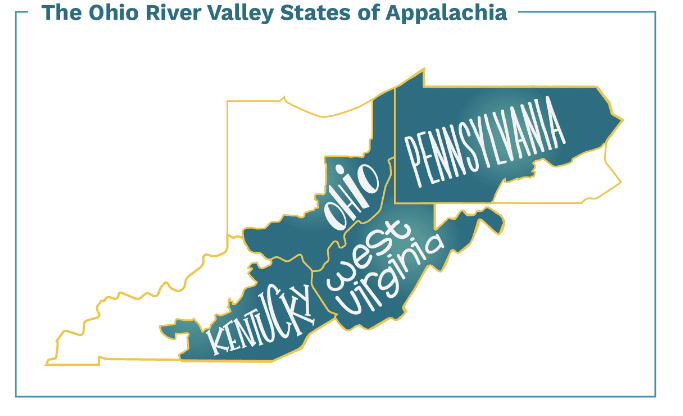 ReImagine Appalachia is a broad and inclusive coalition of individuals and organizations based in the Ohio River Valley of the United States’ Appalachian Mountain region. The coalition came together to find common ground and build a 21st century economy that’s good for workers, communities, and the environment. ReImagine Appalachia has advocated for Appalachian priorities, such as funding abandoned mineland remediation,receiving federal infrastructure bills, and is currently working to make sure investment flows from Washington to the region. I’m Natalia Rudiak, the Director Special Projects at ReImagine.
ReImagine Appalachia is a broad and inclusive coalition of individuals and organizations based in the Ohio River Valley of the United States’ Appalachian Mountain region. The coalition came together to find common ground and build a 21st century economy that’s good for workers, communities, and the environment. ReImagine Appalachia has advocated for Appalachian priorities, such as funding abandoned mineland remediation,receiving federal infrastructure bills, and is currently working to make sure investment flows from Washington to the region. I’m Natalia Rudiak, the Director Special Projects at ReImagine.
Thanks to the international Just Transition workshop series sponsored by the Just Transition Fund and Climate Strategies, our respective regions were able to establish contact. This resulted in my wonderful visit to Konin, Poland to meet with representatives of trade unions, the Kleczew municipality, the regional economic development authority(a non-governmental organization (NGO) which builds ecosystems for sustainable employment), and a climate advocacy organization to learn about how workers, their families, and individuals affected by displacement shocks are finding their way in the new economy.
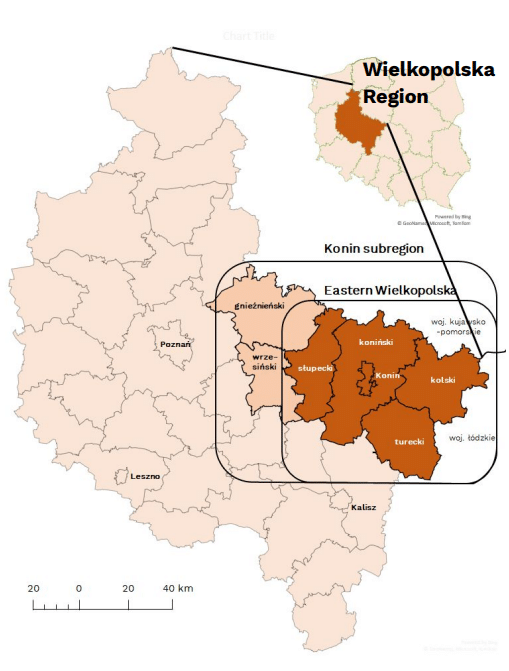
In August 2024, I was hosted by Przemysław Piechocki, President of the Board of Stowarzyszenie na Rzecz Spółdzielni Socjalnych, or the Association of Social Cooperatives based in Poznań, Poland. The Association’s goal is to create new social economic entities, primarily by supporting the creation of social cooperatives, through new and existing businesses. In Eastern Wielkopolska the Association operates the Social Economy Support Centre (WOES – Wielkopolski Osrodek Ekonomii Społecznej) which creates sustainable ecosystems in local economies to provide equal opportunity for all workers. At the Centre, crucial general interest services are provided and delivered by locally-based, social economy entities that also provide local job opportunities. The Konin region knows and values the Centre and Association as an important part of the community. Like ReImagine, their team is diverse, consisting of specialists in European financing, legal, social economy, capacity building, marketing, and management.
[Eastern Wielkopolska graphic courtesy of Michał Hetmański, “Just Transition in Eastern Wielkopolska,” Brussels, April 26th 2021, Coal Regions in Transition Virtual Week.]
Trade unions looking toward the future
I had the pleasure of meeting with three members of labor unions including:
- Alicja Messerszmidt, Chairwoman of the KADRA Trade Union at the Konin Brown Coal Mine who is one of the most visible trade union representatives in Brussels,
- Marek Maślak, Board member and treasurer of the KADRA Trade Union at the Konin Brown Coal Mine, and
- Maciej Kaźmierczak, RUCH Independent Trade Union of the Workers Movement
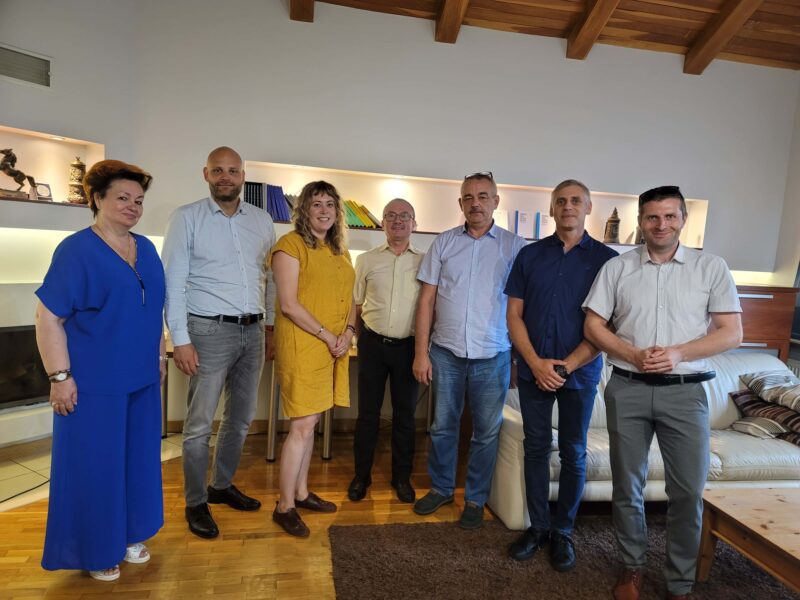
[PHOTO: Left to Right – 1. Alicja Messerszmidt, 2. Przemysław Piechocki, 3 Natalia Rudiak, 4. Marek Maślak, 5. Maciej Kaźmierczak, 6. Robert Ligocki (Stowarzyszenie na Rzecz Spółdzielni Socjalnych) 7. Jarosław Wypyszyński (Stowarzyszenie na Rzecz Spółdzielni Socjalnych), at the WOES Office, Konin, Poland]
I learned about the history of coal in the region, dating back to German occupation, and how the Konin’s regional economy was restructured around coal. At its peak in the 1980s, the industry employed 15,000 workers; now that number has dwindled down to 2700. What makes Konin unusual compared to the rest of the country is that the central, contemporary employment entity – ZE PAK S.A. (formerly Zespół Elektrowni Pątnów – Adamów – Konin) – is private and not public. The company’s coal-fired power plants and coal mines were consecutively shut down from 2012 onwards, and ownership decided to take the bold step of announcing the closing of the entirety of excavation operations by 2030, making the move towards energy transition. The region also proposed achieving climate neutrality by 2040, the most ambitious target in the country. In 2019 the region’s trade unions went to Brussels, the capital of the European Union (EU), to convince EU officials to support the thousands of displaced and soon-to-be displaced workers. Not only were jobs lost, but cultural identity is being mourned.
A long and arduous process began to forge a partnership between 14 labor unions and leadership of ZE PAK and a blueprint was created for worker reskilling, upskilling, and entrepreneurship. This resulted in both:
1) the unique, wide-reaching “Jobs After Coal” initiative, funded by the EU Just Transition Fund and the Polish government, and
2) National government legislation for direct cash payments to support displaced workers.
Job After Coal Initiative
The main goal of the Jobs After Coal initiative is to create and retain high-quality jobs in the community. What is innovative about this program is that it is dedicated not only to current and former ZE PAK workers, but also their family members, workers threatened by displacement, subcontractors, and businesses indirectly affected by coal facility closures. The program is currently focused on 2,200 individuals, and funded at 257 million PLN, or about $60 million, with 70% of the funding from the EU Just Transition Fund and 30% by the Polish government.
There are two pathways for individuals to enter the program: 1) Creating jobs in existing enterprises, and 2) Opening their own individual and collective businesses.
There are 10 partners involved in this initiative, and the head of the program is the regional labor department. Przemysław from the Association of Social Cooperatives is one of the partners in helping individuals develop their own businesses, including collective businesses like social enterprises and cooperatives. (In fact, we were treated to an amazing lunch of traditional schabowe cutlets, and żurek soup, cooked up by one of the initiative’s enterprises.) (Sorry, no mouth-watering photos.)
Employers who hire participants in the “Jobs After Coal” program can receive up to 150,000 PLN (nearly $40,000) which is 4x more than any other job transition program in Poland. Participants can also get grants for $30,000 for initial seed investment in their own enterprises, and additional cash flow support of $10,000. As a condition of receiving the funding, the proposed employment must last at least 2 years. For entrepreneurs, the innovation is that support does not end at the moment of starting business, but lasts as long as it is needed. New entrepreneurs can count on holistic support which every burgeoning business needs: legal, management, marketing, accounting, business advocacy with potential customers, etc. This boosts capacity and gives new business owners time to focus more on running day-to-day operations. Wrap-around support is based on an individual development plan developed separately for each participant.
Each support tool has their own rights and requirements. If an existing employer stacks another employment incentive, e.g. additional subsidizing of employment, this requires an additional 2 years of retainment. The funds can be used for equipment, covering the costs of transportation if there is more than a 30 minute commute, and renting an apartment if the job opportunity is away from home. If the person is opening their own enterprise, the funding can go towards accounting, legal, marketing, and other services.
The initiative organizers hope it “can serve as a model for other coal regions and an example of successful cooperation between public institutions, employers, and trade unions.”
One contrast between this and the work of ReImagine Appalachia is that ReImagine is focused on workforce development and employment programs that are most often connected to employers, rather than entrepreneurial initiatives. Like the Konin coalition, we continue to advocate for funding for workforce and employment programs designed to reconnect disconnected and dislocated workers. And further, we advocate for training models to equip workers with skills for quality jobs in industries such as construction, clean energy and manufacturing.
Poland has social programs that include publicly-funded health care, paid parental leave, and child care facilities.These fundamental social supports make the possibility of entrepreneurship more equitable for middle- and low-income families. In the United States, most small businesses do not have union-based employment. It is often challenging for retail and service workers to obtain family-supporting benefits within the structure of the American economic and social service system. This hampers the ability for former fossil field workers and their families to stake it out on their own as entrepreneurs. One entrepreneurial pathway to family-sustaining jobs is the worker cooperative, a model where the business is owned and operated, and the profit is shared by the workers themselves. ReImagine Appalachia is very interested in this model.
The burgeoning recreational economy is a case study around the inherent challenges of entrepreneurship. As we mention on our website, we believe local residents need a fair shot at opening Main Street businesses, working in hospitality, or building and maintaining a trail while earning a family sustaining salary and health benefits. There is still much work to be done to ensure equal benefits and wages for all in this sector.
National legislation – Ustawa o osłonach socjalnych dla pracowników sektora elektroenergetycznego i branży górnictwa węgla brunatnego, August 2023 (on social protection for employees of the electricity sector and the lignite mining industry)
Modeled after similar legislation in the Silesia coal region in Southern Poland, the negotiation of this national legislation involved the representatives from labor unions, employers (including ZE PAK), and three government ministries. In the last assembly of the Polish Parliament, virtually all legislators voted for it. The legislation mandates that displaced coal energy company workers can get severance support for four years at 80-100% of their salary; EU has granted approval and it is now estimated that this can affect approximately 23,000 persons in the lignite and energy sector in Poland.
ReImagine Appalachia
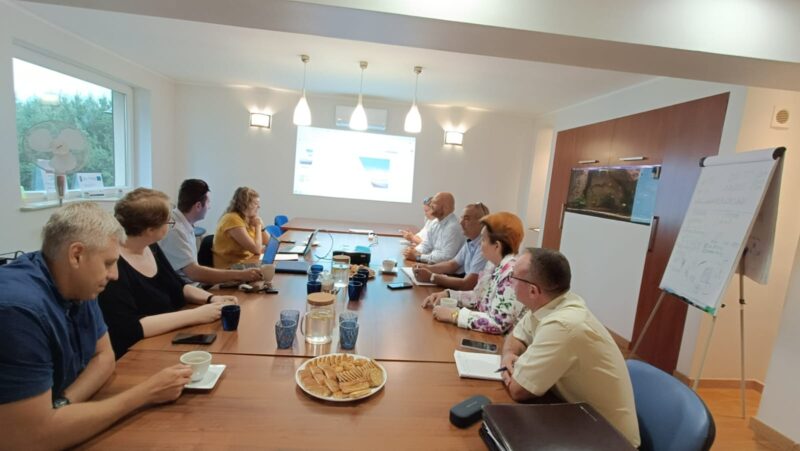
[PHOTO: at the WOES Office in Konin.]
During this visit, I also presented the work of ReImagine Appalachia, including our coalition structure which also includes the labor federations for each of our states. In both Eastern Wielkopolska and the Ohio River Valley, trade unions and their membership are integral to making sure that change roots from the ground-up and that new jobs that are created are equal in quality and pay to fossil fuel jobs. I spoke about the Bipartisan Infrastructure Law (BIL) of 2021 and the Inflation Reduction Act (IRA), and how organizations like ReImagine, the Blue-Green Alliance and others advocated for inclusion of labor provisions to be baked into the legislation. For example, this includes the Department of the Treasury incentivizing collective bargaining agreements, the offering of additional investment tax credits for prevailing wage and apprenticeship programs, and the Department of Interior Abandoned Mine Land Grant Program guidance prioritizing hiring former and current coal miners. There was much interest in how Wielkopolska stakeholders could also build in labor standards to potential future investment.
I also reviewed the sectors in which ReImagine Appalachia primarily has advocated for funding, which includes sustainable manufacturing, transportation, modernizing the grid, as well asaccessible and affordable broadband, natural infrastructure workforce development, and repairing damaged land. Through an in-depth PowerPoint presentation I went into each area in detail with the respective funding and programs in the IRA and BIL, and examples of implementation. The Polish team was extremely interested in possibilities for national Polish government investment in these sectors as well. Could an IRA-styled, multi-stakeholder, Polish climate infrastructure law be on the horizon?
Municipalities for economic diversification
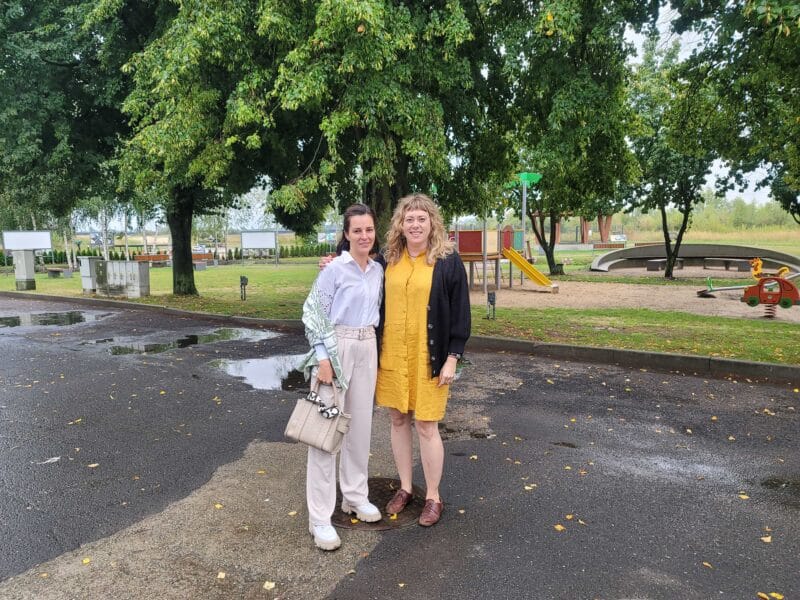
I also had the pleasure of meeting with the mayor and administrative staff of Kleczew, Poland where a mining pit has been transformed into a regional park. There is a new, man-made lake and beach, along with recreational facilities that include a zip line, bike, hiking, and ATV trails, a gazebo with picnic shelters, and a hostel. The next stage of planning will be creating additional hotel and overnight facilities so more people can take advantage of the amenities. This transformation was co-funded by European Regional Development Funds for Wielkopolska.
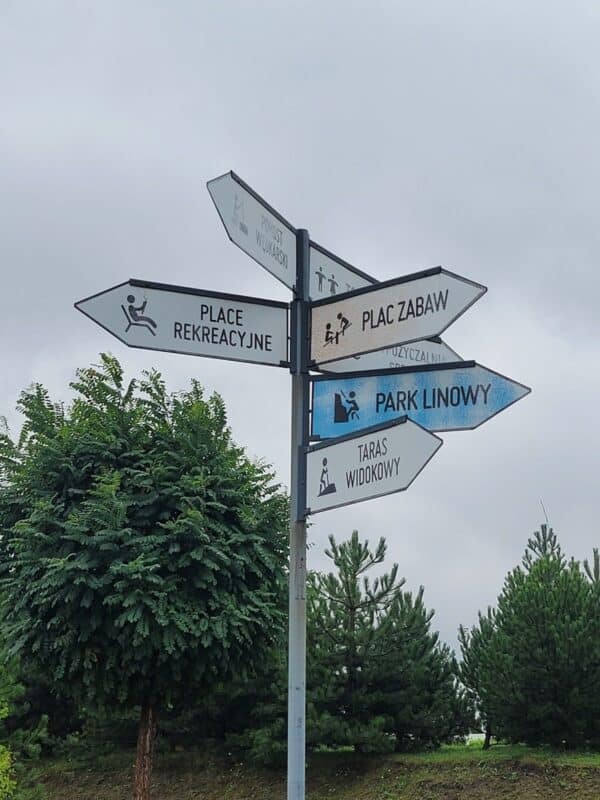
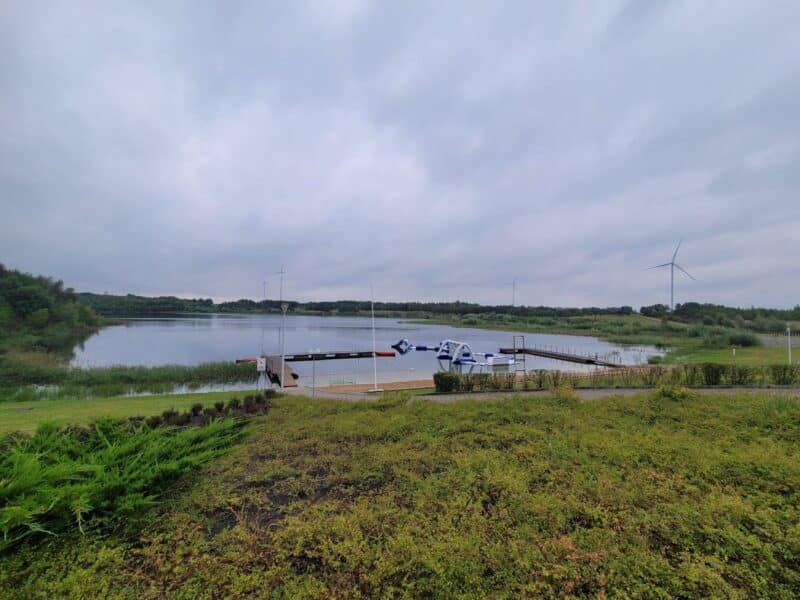
[PHOTOS: 1) Natalia Rudiak and Kleczew Mayor Anna Skórzewska, 2) Photo displaying the recreational activities at Park Linowy in Kleczew, including a playground, zip line, viewpoints, and other recreational areas. 3) View of the lake, port and beach at Park Linowy, Kleczew, Poland.]
Regional economic cooperation for just transition
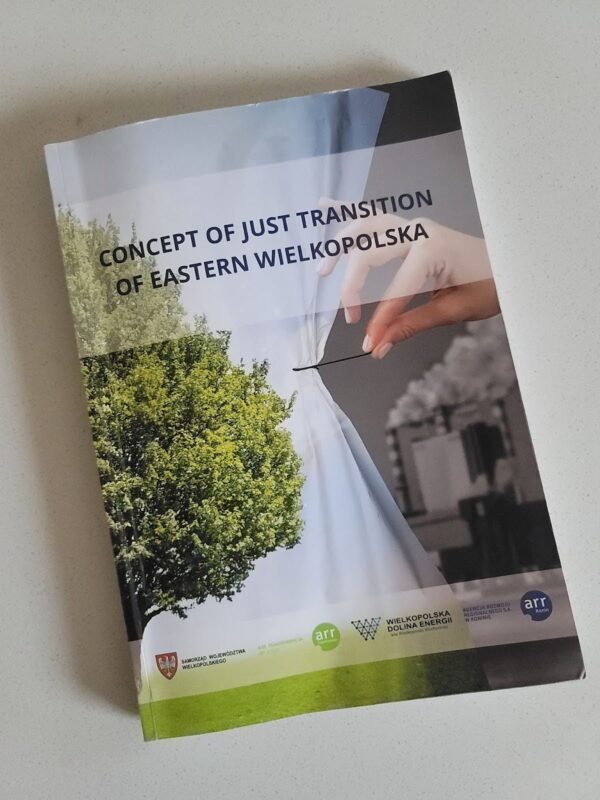 I also had the pleasure of meeting with the regional economic development agency in the Konin region (Agencja Rozwoju Regionalnego (ARR) S.A. w Koninie), specifically with:
I also had the pleasure of meeting with the regional economic development agency in the Konin region (Agencja Rozwoju Regionalnego (ARR) S.A. w Koninie), specifically with:
- Maciej Sytek – President of the Board, Regional Development Agency in Konin
- Krzysztof Borkowicz – Area Coordinator, Regional Development Agency in Konin
We discussed the Just Transition Platform for Eastern Wielkopolska, which began in 2018 through the directive of the state of Wielkopolska. There were four stakeholder teams to create the plan: NGOs including local activists, labor unions, businesses (including ZE PAK), and local government. Overall 80 stakeholders went to work to gather input into 4 areas of focus: Energy Security, Infrastructure, Environment, and Social Issues.
[PHOTO: Photo of Just Transition Platform for Eastern Wielkopolska
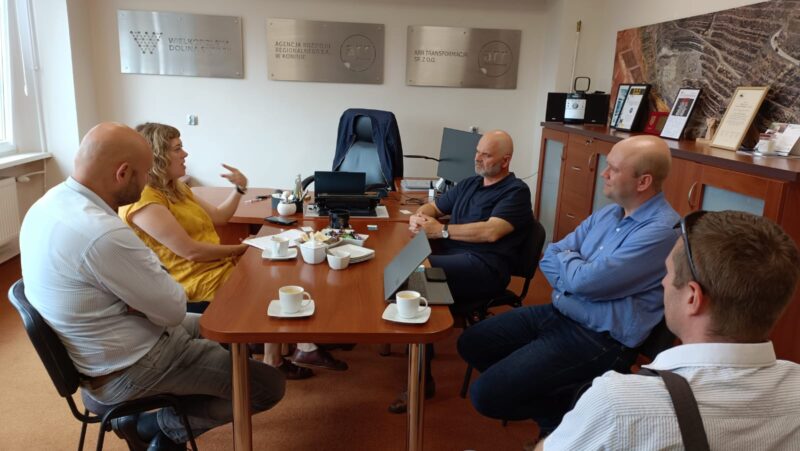
[PHOTO: at the regional economic development agency in the Konin region]
The 200+ page “Concept of Just Transition” document was the first of its kind in Poland. However, as Maciej said, “the document isn’t the most important, it is only the result. The most important is the process that brought us all together. The stakeholders are the ambassadors for this vision.” This ushered in a new culture, new identity, and new vision for the region. The point was made that though an observer from Warsaw, Poznan, or abroad may see statistics of job loss, every single job loss is a story. Furthermore, the scale of job losses is staggering. In a place like Kleczew, with a population of 10,000, 400 people worked for ZE PAK (statistically averaging 4 people per family, that means 1,600 people are affected, i.e. 15% of the population). We heard about how the loss of individual wage and business taxes can indirectly affect local businesses from hair salons to restaurants, which is similar to coal regions across the globe. Thus, in post-coal economic development revitalization efforts “we’re not just building jobs, we’re building hope.” Stories of hope are also a common theme across our Appalachian region, so much so that we at ReImagine have dedicated resources to telling them.
One of the initial investments from the Just Transition Concept Plan was 400 million Euro for a Just Transition Fund for Eastern Wielkopolska. The Just Transition fund organizes competitions for funding around seven strategic goals: 1) Employment, 2) Small and medium-sized enterprise (SME), 3) Research and development, 4) Regional marketing, 5) Transportation, 6) Energy, and 7) Societal Infrastructure. For one competition, 200 firms competed for funding for job creation and economic development, and 100 firms were able to receive funding. It was noted that in order to get a subsidy, a large company must create more jobs than an SME would, promoting local wealth and shared prosperity, another theme shared in Appalachia.
One of the interesting points of connection was the idea of a blueprint for Just Transition. ReImagine Appalachia put together the Appalachian Climate Infrastructure Blueprint with similar stakeholders, similar to the Concept of Just Transition in Wielkopolska.
Data-powered campaigns
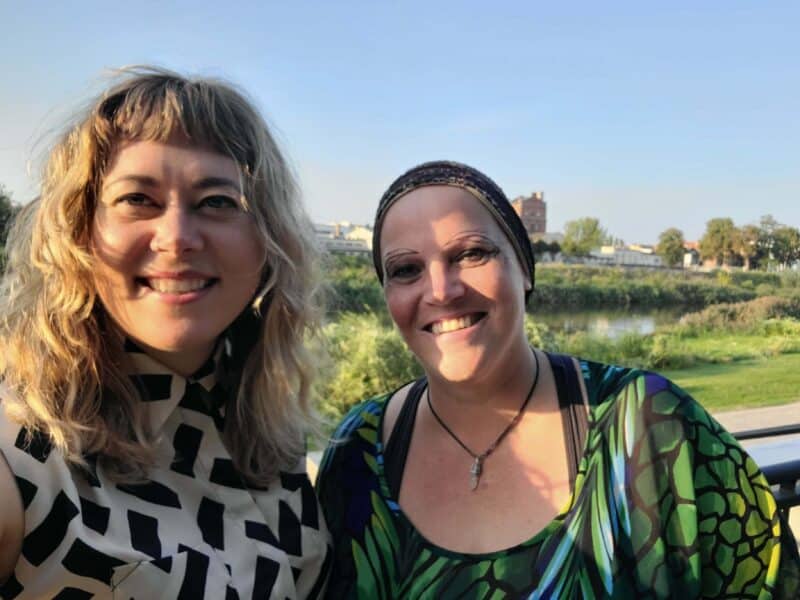 Through another connection made in the Just Transition Fund workshop, I was also able to meet with Miłosława Stępień, municipal activist, former secretary of the Polish Green Party, and Just Transition Coordinator for Bankwatch, the largest network of grassroots, environmental and human rights groups in central and eastern Europe.
Through another connection made in the Just Transition Fund workshop, I was also able to meet with Miłosława Stępień, municipal activist, former secretary of the Polish Green Party, and Just Transition Coordinator for Bankwatch, the largest network of grassroots, environmental and human rights groups in central and eastern Europe.
[PHOTO: Natalia Rudiak, Miłosława Stępień of Bankwatch, Konin, Poland]
Bankwatch monitors often obscure public finance institutions that are responsible for hundreds of billions of investments globally, yet frequently function outside public scrutiny. Miłosława and her team investigate the impact of the decisions of these organizations, and work with frontline communities and local groups to help them protect their land and their rights, and share their stories with European powerbrokers. Again, similar to ReImagine Appalachia, storytelling can often show the impact of policies more than data and statistics.
I also learned about the potential greenwashing of projects in the region, and the importance of local activists holding governments and NGOs responsible for how public and private investment truly impacts people and place.
I am a former City Councilperson in the City of Pittsburgh, Pennsylvania and Miloslawa has run for office and has been involved in national politics, being the force behind the election of Parliamentary legislators. Together we shared common themes of the trials and tribulations of local and federal politics, which is so similar across borders.
—
Overall, this visit was extremely fruitful in sharing both strategic and tactical concepts we are working on and implementing. Already, the Eastern Wielkopolska Just Transition document has been shared with the Appalachian Sustainable Business Network, providing structural and topical inspiration for their potential process to develop a region-wide sustainable business network plan. We hope this is the first step to what we hope will be a more permanent cooperation between our coal countries in the future!
<< Back to news